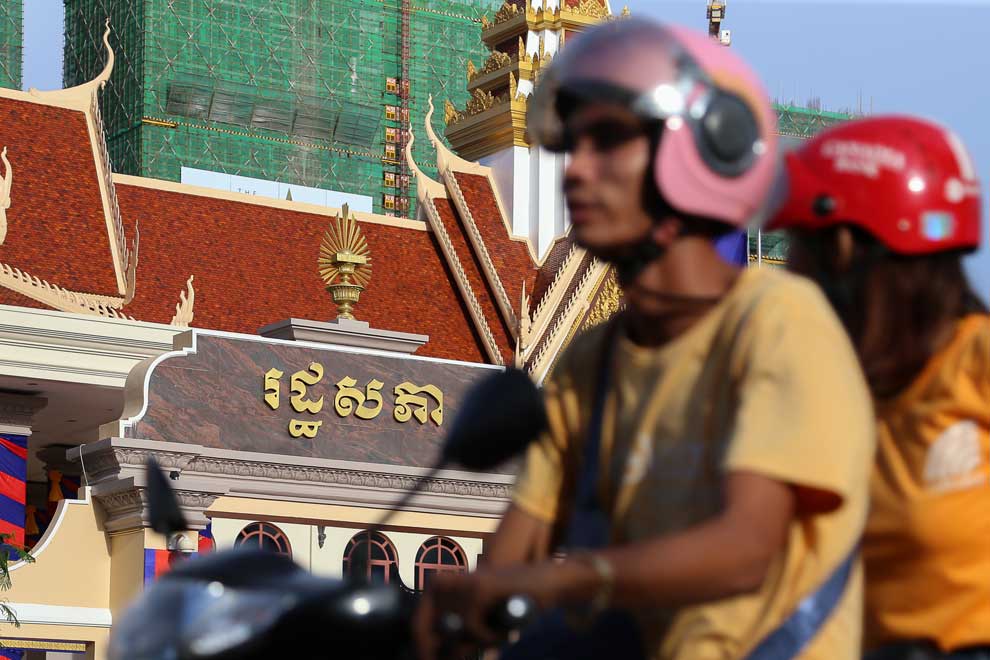
The bill could become law next week, Kin Phea says. Hong Menea
The National Assembly (NA) said it will postpone all unnecessary meetings in line with guidance from the Ministry of Health and the World Health Organisation (WHO) amid the Covid-19 pandemic.
However, it did not say when or how it will debate the “state of emergency” draft law, which was approved by the Council of Ministers’ Standing Committee chaired by Prime Minister Hun Sen on Tuesday.
In his speech posted on the NA website, president Heng Samrin said the fourth parliament session in the 6th legislative mandate was due to begin on Thursday but has been delayed due to the outbreak.
“For meetings that are not priorities, the NA’s Standing Committee will postpone them,” he said.
NA spokesperson Leng Peng Long also issued a statement saying the legislative body had held several extraordinary sessions over the past three months, having passed nine laws and approved the government’s Cabinet reshuffle.
But the NA’s fourth session has been postponed, he said.
“In line with measures laid out by the government and WHO to curb the spread of Covid-19, the Standing Committee has decided not to invite lawmakers, or local and international guests to attend the fourth session’s opening,” he said.
It was unclear as to when and how the NA would debate the state of emergency draft law. As of press time on Thursday, Peng Long told The Post that the NA had not received the bill.
He said the NA will hold a session on the draft law with caution amid the coronavirus outbreak. He declined to elaborate on how the NA will discuss the bill, saying only that a session through video conferencing is not allowed under Cambodian law.
Consisting of five chapters and 11 articles, the draft law stipulates a maximum 10-year imprisonment for anyone caught breaking it.
The bill sets out formalities, procedures and terms for a declaration of a state of emergency if the country runs into danger.
It aims to maintain national security and public order,lives and health of the people, properties and the environment.
Kin Phea, the director of the Royal Academy of Cambodia’s International Relations Institute, said the postponement was a good decision. But he said the state of emergency bill could become law next week at the latest.
“I think the National Assembly and Senate won’t need much time to approve it, and it could come out next week because this is a vital law.
“It’s a tool to be used when the risks of a disease outbreak are high. A province, region, or town can be placed under a state of emergency when we have the law in hand. Otherwise, we cannot impose a ban on the public. The government must make it readily available when the situation warrants it,” he said.
But Phea said even if the bill is passed next week, he was of the view that it would not be enforced before or during the upcoming Khmer New Year.
He said the law is more likely to be enforced in areas where many cases of Covid-19 infections have been reported.
On Thursday, the Ministry of Health reported a new case of infection in Preah Sihanouk province, bringing the total to 110 in the Kingdom, 30 of them are women.
The latest case was found in a 58-year-old Cambodian man who had been in direct contact with the more than 30 virus-infected French tourists at a hotel in Sihanoukville.
The ministry said so far 34 people have recovered. The latest patients to have recovered included a man in Siem Reap who recently returned from a religious gathering in Malaysia and a Belgian national in Phnom Penh. Both were discharged from hospital on Thursday.
Seven of the French tourists who have been quarantined and treated at the hotel in Sihanoukville have also recovered and are waiting to return home, the ministry said.
Despite a notable number of recoveries in the Kingdom, WHO country director Li Ailan urged caution in a tweet.
“While we are busy with the response to imported cases and local transmission, we should also take urgent actions in preparing for large scale community transmission,” she stressed.












